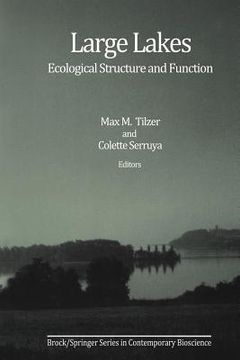Compartir
large lakes: ecological structure and function (en Inglés)
Max M. Tilzer
(Ilustrado por)
·
Colette Serruya
(Ilustrado por)
·
Springer
· Tapa Blanda
large lakes: ecological structure and function (en Inglés) - Tilzer, Max M. ; Serruya, Colette
$ 491.521
$ 893.674
Ahorras: $ 402.153
Elige la lista en la que quieres agregar tu producto o crea una nueva lista
✓ Producto agregado correctamente a la lista de deseos.
Ir a Mis Listas
Origen: Estados Unidos
(Costos de importación incluídos en el precio)
Se enviará desde nuestra bodega entre el
Jueves 30 de Mayo y el
Jueves 13 de Junio.
Lo recibirás en cualquier lugar de Colombia entre 1 y 5 días hábiles luego del envío.
Reseña del libro "large lakes: ecological structure and function (en Inglés)"
The vast majority of the world's lakes are small in size and short lived in geological terms. Only 253 of the thousands of lakes on this planet have surface areas larger than 500 square kilometers. At first sight, this statistic would seem to indicate that large lakes are relatively unimportant on a global scale; in fact, however, large lakes contain the bulk of the liquid surface freshwater of the earth. Just Lake Baikal and the Laurentian Great Lakes alone contain more than 38% of the world's total liquid freshwater. Thus, the large lakes of the world accentuate an important feature of the earth's freshwater reserves-its extremely irregular distribution. The energy crisis of the 1970s and 1980s made us aware of the fact that we live on a spaceship with finite, that is, exhaustible resources. On the other hand, the energy crisis led to an overemphasis on all the issues concerning energy supply and all the problems connected with producing new energy. The energy crisis also led us to ignore strong evidence suggesting that water of appropriate quality to be used as a resouce will be used up more quickly than energy will. Although in principle water is a "renewable resource," the world's water reserves are diminishing in two fashions, the effects of which are multiplicative: enhanced consumption and accelerated degradation of quality.
- 0% (0)
- 0% (0)
- 0% (0)
- 0% (0)
- 0% (0)
Todos los libros de nuestro catálogo son Originales.
El libro está escrito en Inglés.
La encuadernación de esta edición es Tapa Blanda.
✓ Producto agregado correctamente al carro, Ir a Pagar.

